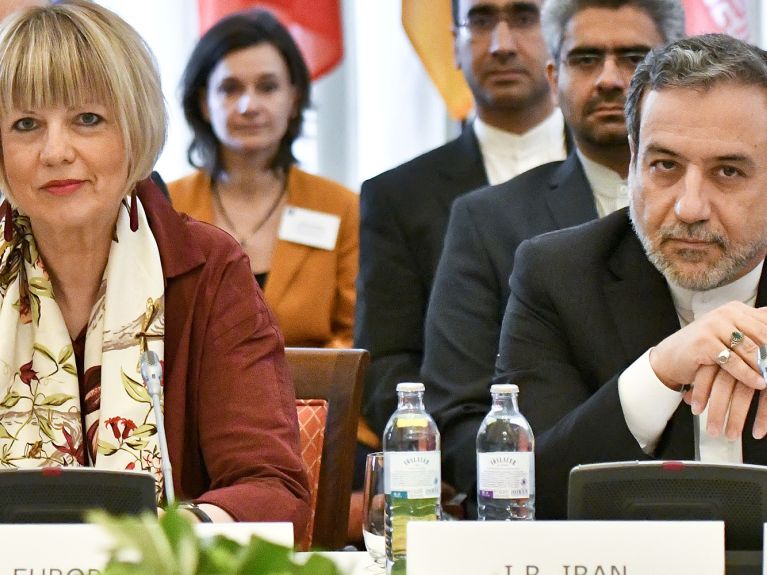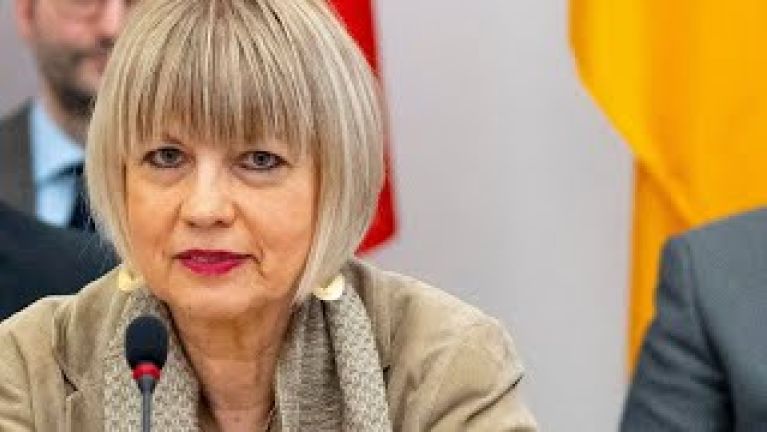Skilful, persevering, approachable
Helga Schmid is the new Secretary General of the OSCE. The German top diplomat is regarded as amiable in tone and tough on the issues.

There are people who have over many years made important contributions to the integration of Europe yet are still known only to a small specialist audience. Among these is the German diplomat Helga Schmid, who has been working for the European Union since 2006 and has headed the European External Action Service (EEAS) as Secretary General since 2016. She played a decisive role in setting up this agency, which now has around 4,500 employees and has done a great deal for the common foreign policy and security policy of EU countries.
The 60-year-old diplomat may now be making more public appearances and be mentioned more often in the news. For Schmid is the new General Secretary of the Organization for Security and Cooperation in Europe (OSCE), as the foreign ministers of the 57 OSCE states decided at the beginning of December 2020. The Bavarian-born Schmid, who entered the service of the German Federal Foreign Office at the end of the 1980s, has thus reached the hitherto high point of her diplomatic career.
Dieses YouTube-Video kann in einem neuen Tab abgespielt werden
YouTube öffnenThird party content
We use YouTube to embed content that may collect data about your activity. Please review the details and accept the service to see this content.
Open consent formThe OSCE is a child of the détente policy of the 1970s; it includes all European countries, Turkey, Mongolia, all the successor states of the Soviet Union, and the USA and Canada. Its most important goals are securing stability, peace and democracy. It also conducts observation missions on armed conflicts, such as in eastern Ukraine, where Russia-backed separatists and Ukrainian military are confronting one another, and in Nagorno-Karabakh, where in late 2020 Azerbaijan inflicted heavy losses on Armenia in the first real drone war in history.
As Secretary General, initially elected for three years, Schmid will continue to develop the structure of the organization and initiate, as representative of the chairman, currently Albania’s Prime Minister Edi Rama, processes of political dialogue amongst the member states. She will use her many contacts to discover tensions and conflicts in Europe at an early stage, before they can spread and broaden.
A difficult and important task awaits Helga Schmid.
In the opinion of the German Federal Foreign Minister Heiko Maas, no one is better suited than Schmid to make the OSCE, which was in crisis in mid-2020 because some member states blocked the re-election of its leadership, again capable of acting. “A difficult and important task awaits Schmid”, said Maas. He has “great confidence in her”.
In this judgement Maas is not alone in the Foreign Office; Germany’s first Green Foreign Minister, Joschka Fischer (in office from 1998 to 2005), publicly praised Schmid’s abilities, and appointed her his office supervisor. Before this, Schmid read Romance and English studies at university and then worked in the Minister’s Office of Fischer’s predecessor, Klaus Kinkel.
Women are the better negotiators.
Fischer, Green political figure, who is known for his vivid rhetoric, occasionally referred to his colleague Schmid as a “spotted hyena”. That was meant as a compliment. This largest member of hyena species has an extraordinarily complex social system and is considered a particularly skilled and extremely persevering hunter.
Colleagues also praise Schmid’s quick wittedness, her hands-on nature, her ability to build networks and, above all, her talent for gaining partners for dialogue through her amiability. “Women are the better negotiators”, she says.
Co-negotiated the agreement on the Iranian nuclear program
On issues of course, diplomat though she is, Schmid is looked upon as tough - which proved useful as an EU representative in the negotiations with Iran on its nuclear program, which were concluded in 2015 after years of difficult struggle. Today Schmid still enjoys the reputation in the Foreign Office of knowing the complicated details of the nuclear treaty better than anyone else. The diplomat negotiated the wording of the 100-page agreement step by step with the then Iranian chief negotiator and later President Hassan Rouhani.
For her commitment and her success, the then German Federal Foreign Minister, Frank-Walter Steinmeier, awarded Schmid the Federal Cross of Merit in November 2015 in Brussels. Steinmeier, who later became Federal President, praised the EU leader for having worked twelve years with a “diplomatic drill in the hand” to achieve a breakthrough in the negotiations with Iran.
With the election of Joe Biden as American President, the EU states are hoping to save the nuclear deal with Iran, which Biden’s predecessor, Donald Trump, has sought to stymie through targeted sanctions and America’s participation in which he cancelled.
Schmid will have enough to do as head of the OSCE, but her experience could be of help in attempting to revive the nuclear treaty with Iran. If need be, so it is said in diplomatic circles, negotiators could consult by telephone with a colleague who is familiar with every detail of the agreement. In future she will be working at the OSCE headquarters, located in the city where she carried on negotiations for years with Iran’s representatives – Vienna.



